University College Birmingham: High Staff Turnover in UK Hospitality
VerifiedAdded on 2022/09/25
|48
|11384
|17
Dissertation
AI Summary
This dissertation draft examines the significant issue of high staff turnover within the UK hospitality industry. The research, conducted for a BA (Hons) in Hospitality Business Management at University College Birmingham, explores the reasons behind this trend, focusing on factors such as better career opportunities, lack of employee empowerment, job satisfaction, and work-life balance. The study incorporates a literature review, theoretical framework, and methodology including primary and secondary research. The findings highlight that employee turnover is a pressing issue in the UK hospitality industry, negatively impacting business performance. The dissertation aims to provide effective solutions and recommendations for employers to improve employee retention, including employee engagement, incentives, career path development, and workload delegation. The research emphasizes the need for sustainable strategies to alleviate the negative effects of high employee turnover, drawing on theories like Maslow's Hierarchy and Herzberg's Theory. The dissertation concludes with recommendations for further research, including exploring staff turnover in other industries and nations, as well as the use of social media in this context.
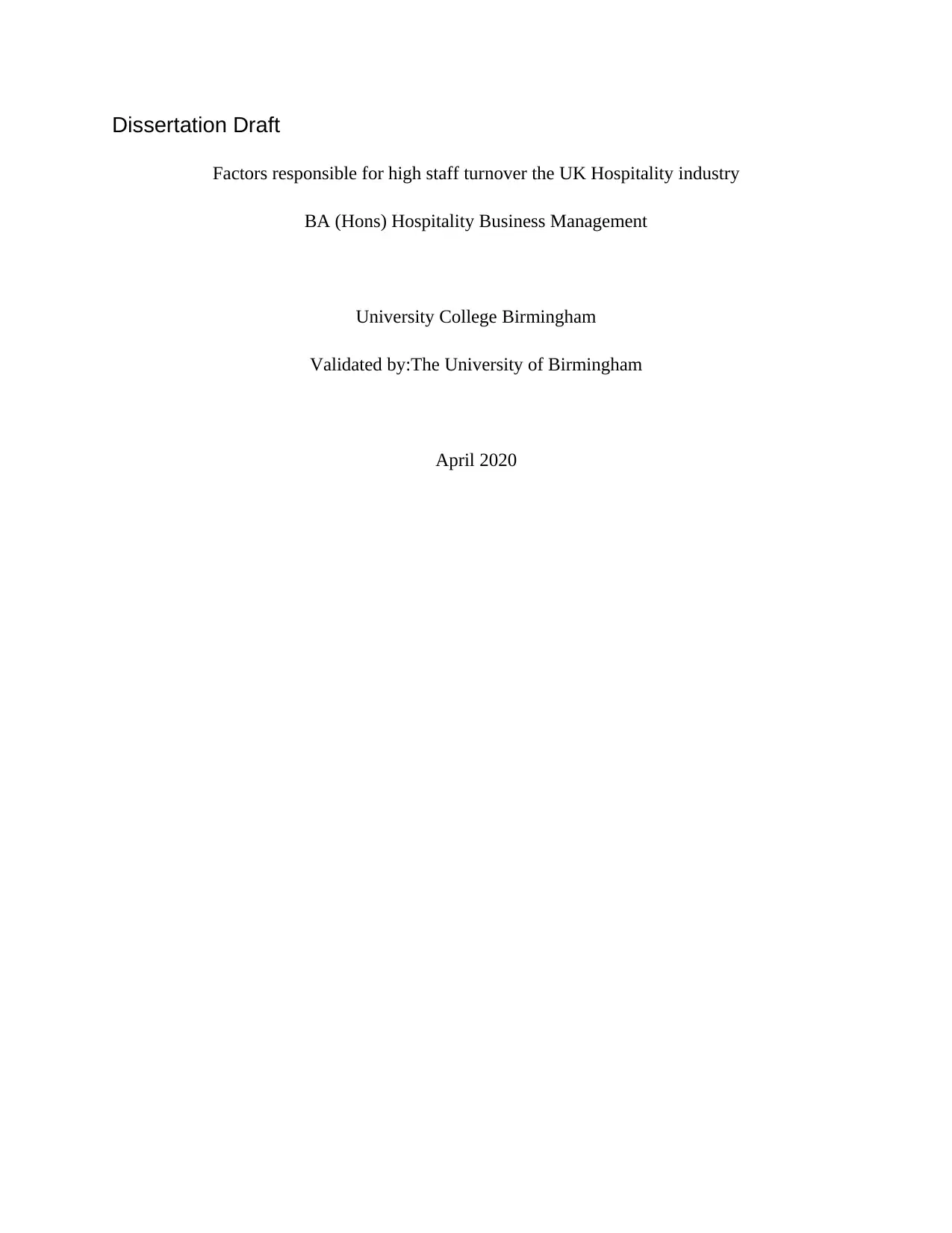
Dissertation Draft
Factors responsible for high staff turnover the UK Hospitality industry
BA (Hons) Hospitality Business Management
University College Birmingham
Validated by:The University of Birmingham
April 2020
Factors responsible for high staff turnover the UK Hospitality industry
BA (Hons) Hospitality Business Management
University College Birmingham
Validated by:The University of Birmingham
April 2020
Paraphrase This Document
Need a fresh take? Get an instant paraphrase of this document with our AI Paraphraser
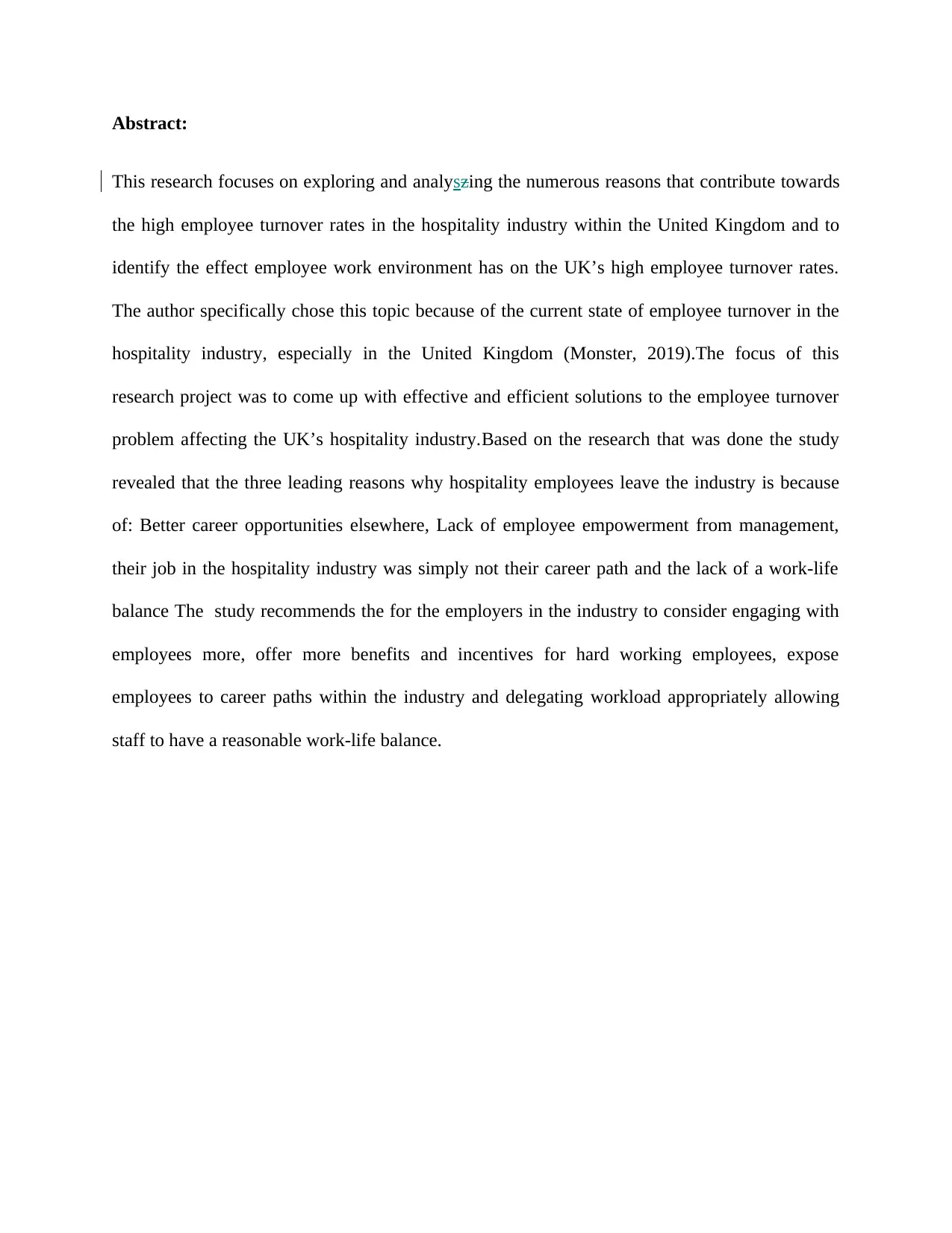
Abstract:
This research focuses on exploring and analyszing the numerous reasons that contribute towards
the high employee turnover rates in the hospitality industry within the United Kingdom and to
identify the effect employee work environment has on the UK’s high employee turnover rates.
The author specifically chose this topic because of the current state of employee turnover in the
hospitality industry, especially in the United Kingdom (Monster, 2019).The focus of this
research project was to come up with effective and efficient solutions to the employee turnover
problem affecting the UK’s hospitality industry.Based on the research that was done the study
revealed that the three leading reasons why hospitality employees leave the industry is because
of: Better career opportunities elsewhere, Lack of employee empowerment from management,
their job in the hospitality industry was simply not their career path and the lack of a work-life
balance The study recommends the for the employers in the industry to consider engaging with
employees more, offer more benefits and incentives for hard working employees, expose
employees to career paths within the industry and delegating workload appropriately allowing
staff to have a reasonable work-life balance.
This research focuses on exploring and analyszing the numerous reasons that contribute towards
the high employee turnover rates in the hospitality industry within the United Kingdom and to
identify the effect employee work environment has on the UK’s high employee turnover rates.
The author specifically chose this topic because of the current state of employee turnover in the
hospitality industry, especially in the United Kingdom (Monster, 2019).The focus of this
research project was to come up with effective and efficient solutions to the employee turnover
problem affecting the UK’s hospitality industry.Based on the research that was done the study
revealed that the three leading reasons why hospitality employees leave the industry is because
of: Better career opportunities elsewhere, Lack of employee empowerment from management,
their job in the hospitality industry was simply not their career path and the lack of a work-life
balance The study recommends the for the employers in the industry to consider engaging with
employees more, offer more benefits and incentives for hard working employees, expose
employees to career paths within the industry and delegating workload appropriately allowing
staff to have a reasonable work-life balance.
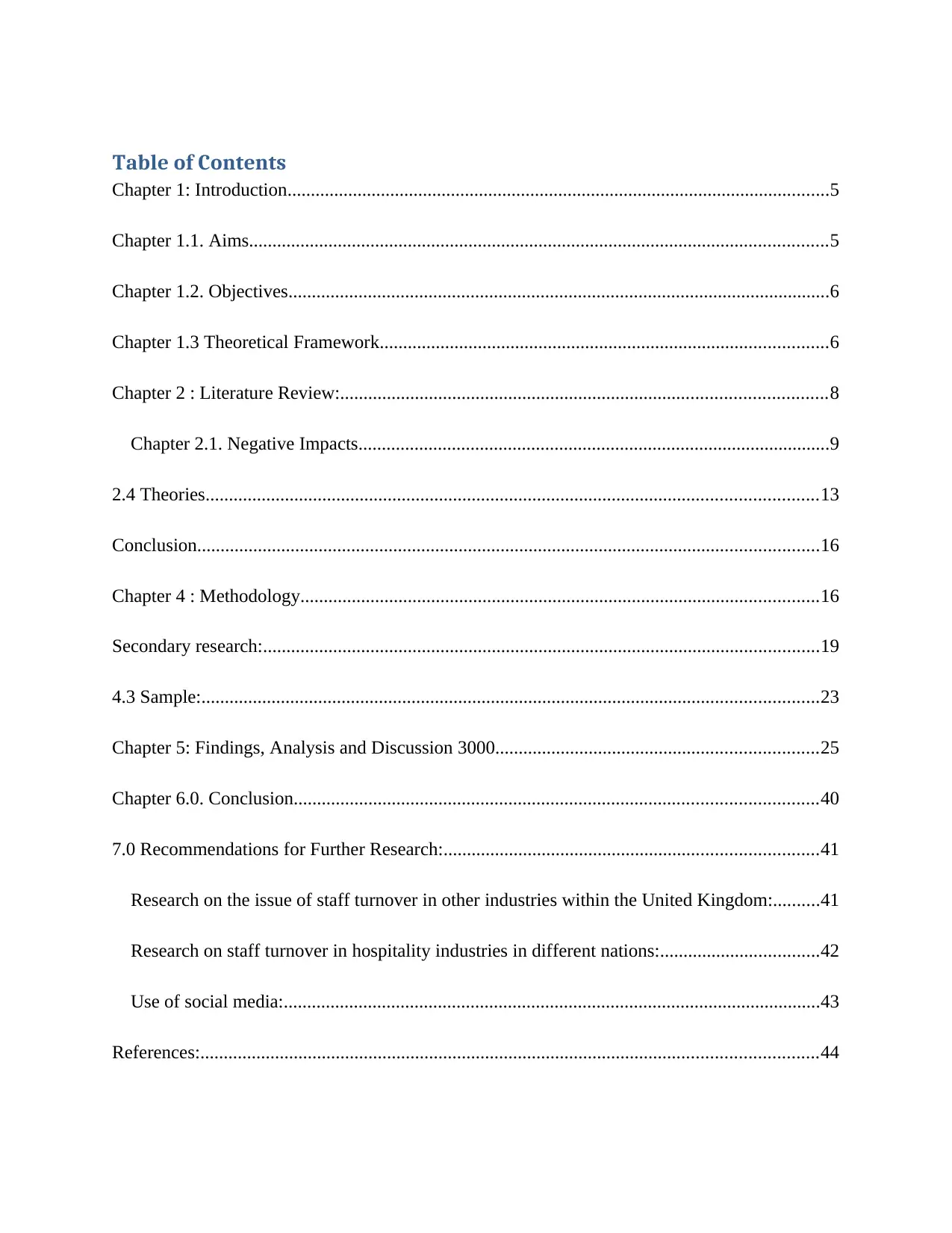
Table of Contents
Chapter 1: Introduction....................................................................................................................5
Chapter 1.1. Aims............................................................................................................................5
Chapter 1.2. Objectives....................................................................................................................6
Chapter 1.3 Theoretical Framework................................................................................................6
Chapter 2 : Literature Review:........................................................................................................8
Chapter 2.1. Negative Impacts.....................................................................................................9
2.4 Theories...................................................................................................................................13
Conclusion.....................................................................................................................................16
Chapter 4 : Methodology...............................................................................................................16
Secondary research:.......................................................................................................................19
4.3 Sample:....................................................................................................................................23
Chapter 5: Findings, Analysis and Discussion 3000.....................................................................25
Chapter 6.0. Conclusion................................................................................................................40
7.0 Recommendations for Further Research:................................................................................41
Research on the issue of staff turnover in other industries within the United Kingdom:..........41
Research on staff turnover in hospitality industries in different nations:..................................42
Use of social media:...................................................................................................................43
References:....................................................................................................................................44
Chapter 1: Introduction....................................................................................................................5
Chapter 1.1. Aims............................................................................................................................5
Chapter 1.2. Objectives....................................................................................................................6
Chapter 1.3 Theoretical Framework................................................................................................6
Chapter 2 : Literature Review:........................................................................................................8
Chapter 2.1. Negative Impacts.....................................................................................................9
2.4 Theories...................................................................................................................................13
Conclusion.....................................................................................................................................16
Chapter 4 : Methodology...............................................................................................................16
Secondary research:.......................................................................................................................19
4.3 Sample:....................................................................................................................................23
Chapter 5: Findings, Analysis and Discussion 3000.....................................................................25
Chapter 6.0. Conclusion................................................................................................................40
7.0 Recommendations for Further Research:................................................................................41
Research on the issue of staff turnover in other industries within the United Kingdom:..........41
Research on staff turnover in hospitality industries in different nations:..................................42
Use of social media:...................................................................................................................43
References:....................................................................................................................................44
⊘ This is a preview!⊘
Do you want full access?
Subscribe today to unlock all pages.

Trusted by 1+ million students worldwide

Paraphrase This Document
Need a fresh take? Get an instant paraphrase of this document with our AI Paraphraser
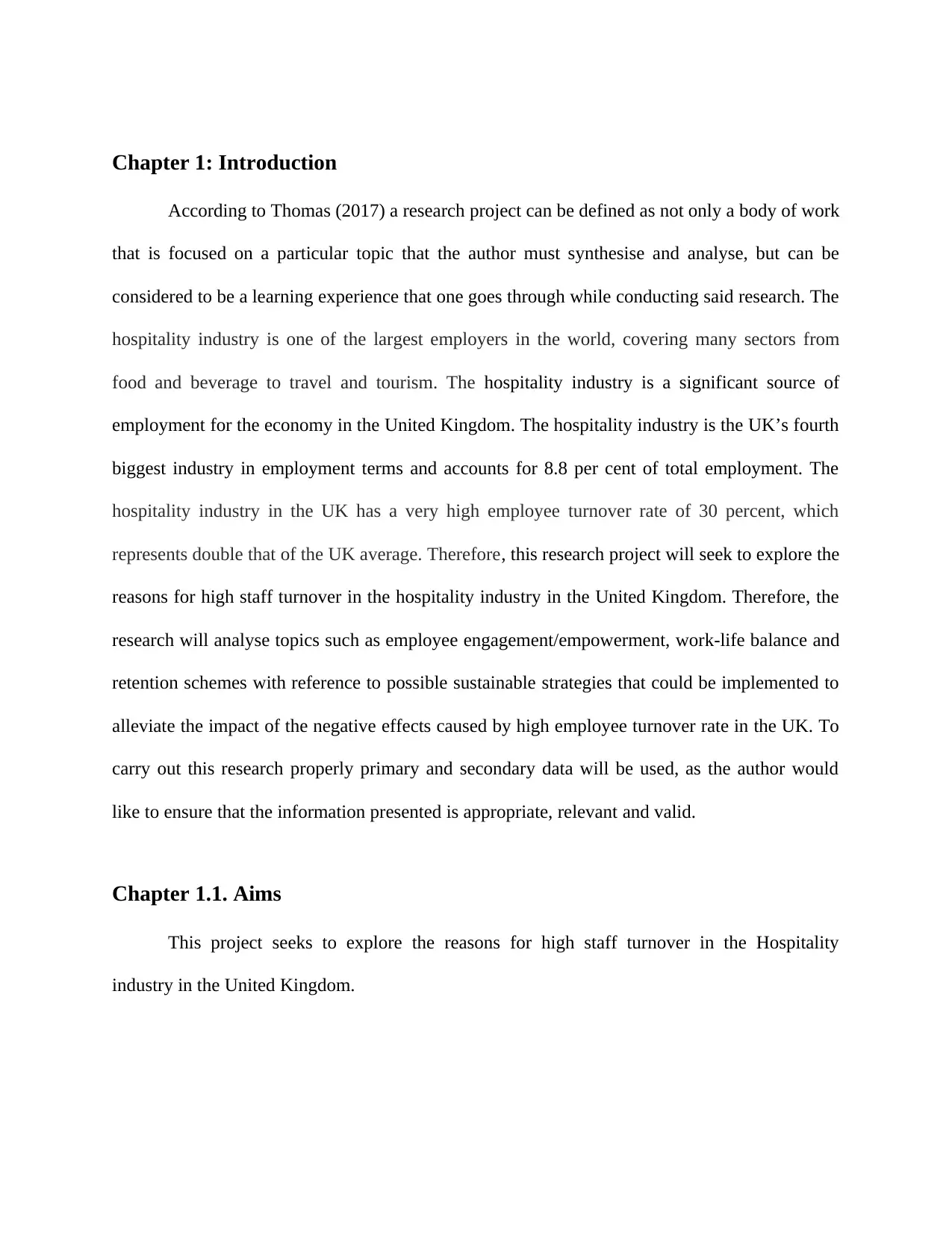
Chapter 1: Introduction
According to Thomas (2017) a research project can be defined as not only a body of work
that is focused on a particular topic that the author must synthesise and analyse, but can be
considered to be a learning experience that one goes through while conducting said research. The
hospitality industry is one of the largest employers in the world, covering many sectors from
food and beverage to travel and tourism. The hospitality industry is a significant source of
employment for the economy in the United Kingdom. The hospitality industry is the UK’s fourth
biggest industry in employment terms and accounts for 8.8 per cent of total employment. The
hospitality industry in the UK has a very high employee turnover rate of 30 percent, which
represents double that of the UK average. Therefore, this research project will seek to explore the
reasons for high staff turnover in the hospitality industry in the United Kingdom. Therefore, the
research will analyse topics such as employee engagement/empowerment, work-life balance and
retention schemes with reference to possible sustainable strategies that could be implemented to
alleviate the impact of the negative effects caused by high employee turnover rate in the UK. To
carry out this research properly primary and secondary data will be used, as the author would
like to ensure that the information presented is appropriate, relevant and valid.
Chapter 1.1. Aims
This project seeks to explore the reasons for high staff turnover in the Hospitality
industry in the United Kingdom.
According to Thomas (2017) a research project can be defined as not only a body of work
that is focused on a particular topic that the author must synthesise and analyse, but can be
considered to be a learning experience that one goes through while conducting said research. The
hospitality industry is one of the largest employers in the world, covering many sectors from
food and beverage to travel and tourism. The hospitality industry is a significant source of
employment for the economy in the United Kingdom. The hospitality industry is the UK’s fourth
biggest industry in employment terms and accounts for 8.8 per cent of total employment. The
hospitality industry in the UK has a very high employee turnover rate of 30 percent, which
represents double that of the UK average. Therefore, this research project will seek to explore the
reasons for high staff turnover in the hospitality industry in the United Kingdom. Therefore, the
research will analyse topics such as employee engagement/empowerment, work-life balance and
retention schemes with reference to possible sustainable strategies that could be implemented to
alleviate the impact of the negative effects caused by high employee turnover rate in the UK. To
carry out this research properly primary and secondary data will be used, as the author would
like to ensure that the information presented is appropriate, relevant and valid.
Chapter 1.1. Aims
This project seeks to explore the reasons for high staff turnover in the Hospitality
industry in the United Kingdom.
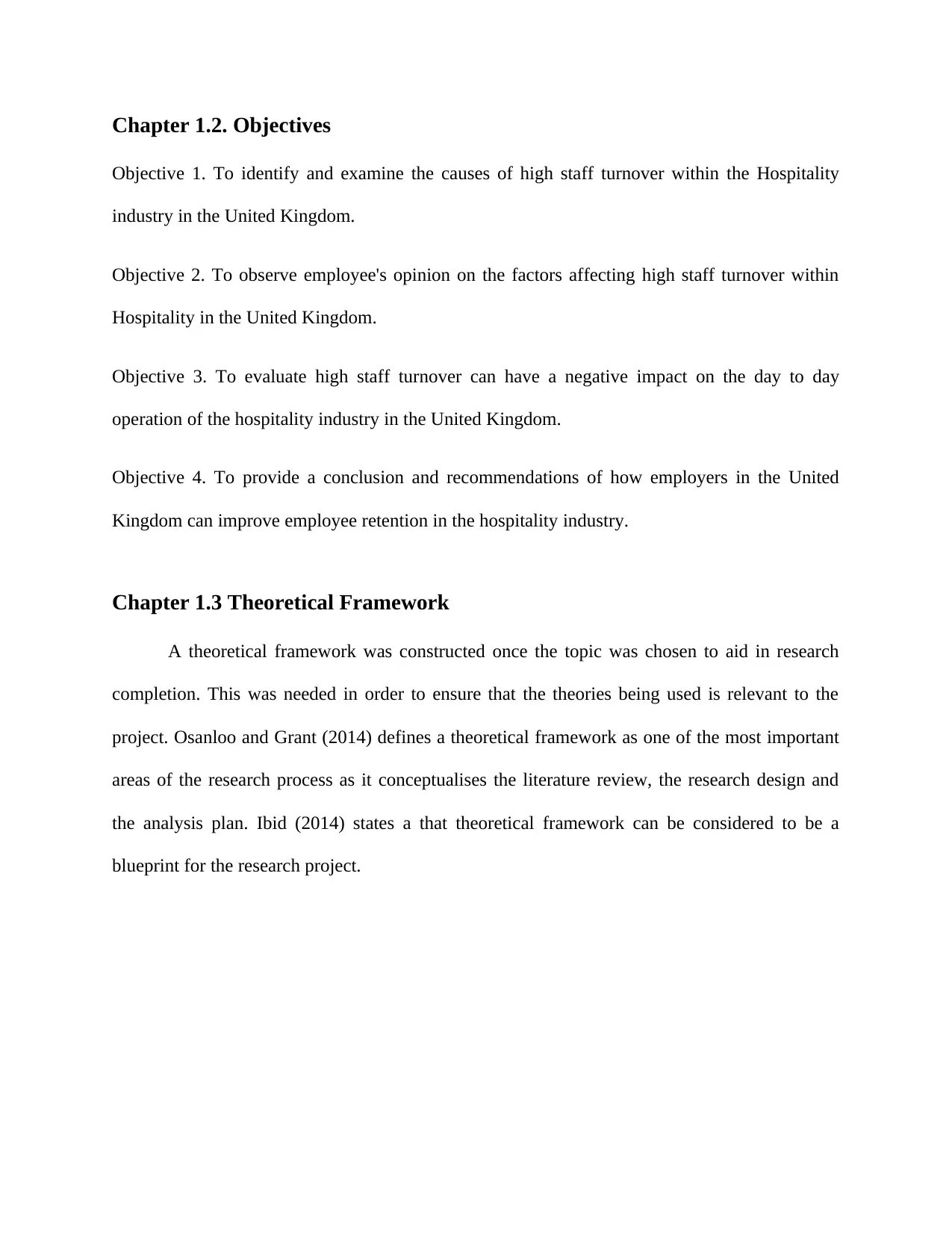
Chapter 1.2. Objectives
Objective 1. To identify and examine the causes of high staff turnover within the Hospitality
industry in the United Kingdom.
Objective 2. To observe employee's opinion on the factors affecting high staff turnover within
Hospitality in the United Kingdom.
Objective 3. To evaluate high staff turnover can have a negative impact on the day to day
operation of the hospitality industry in the United Kingdom.
Objective 4. To provide a conclusion and recommendations of how employers in the United
Kingdom can improve employee retention in the hospitality industry.
Chapter 1.3 Theoretical Framework
A theoretical framework was constructed once the topic was chosen to aid in research
completion. This was needed in order to ensure that the theories being used is relevant to the
project. Osanloo and Grant (2014) defines a theoretical framework as one of the most important
areas of the research process as it conceptualises the literature review, the research design and
the analysis plan. Ibid (2014) states a that theoretical framework can be considered to be a
blueprint for the research project.
Objective 1. To identify and examine the causes of high staff turnover within the Hospitality
industry in the United Kingdom.
Objective 2. To observe employee's opinion on the factors affecting high staff turnover within
Hospitality in the United Kingdom.
Objective 3. To evaluate high staff turnover can have a negative impact on the day to day
operation of the hospitality industry in the United Kingdom.
Objective 4. To provide a conclusion and recommendations of how employers in the United
Kingdom can improve employee retention in the hospitality industry.
Chapter 1.3 Theoretical Framework
A theoretical framework was constructed once the topic was chosen to aid in research
completion. This was needed in order to ensure that the theories being used is relevant to the
project. Osanloo and Grant (2014) defines a theoretical framework as one of the most important
areas of the research process as it conceptualises the literature review, the research design and
the analysis plan. Ibid (2014) states a that theoretical framework can be considered to be a
blueprint for the research project.
⊘ This is a preview!⊘
Do you want full access?
Subscribe today to unlock all pages.

Trusted by 1+ million students worldwide
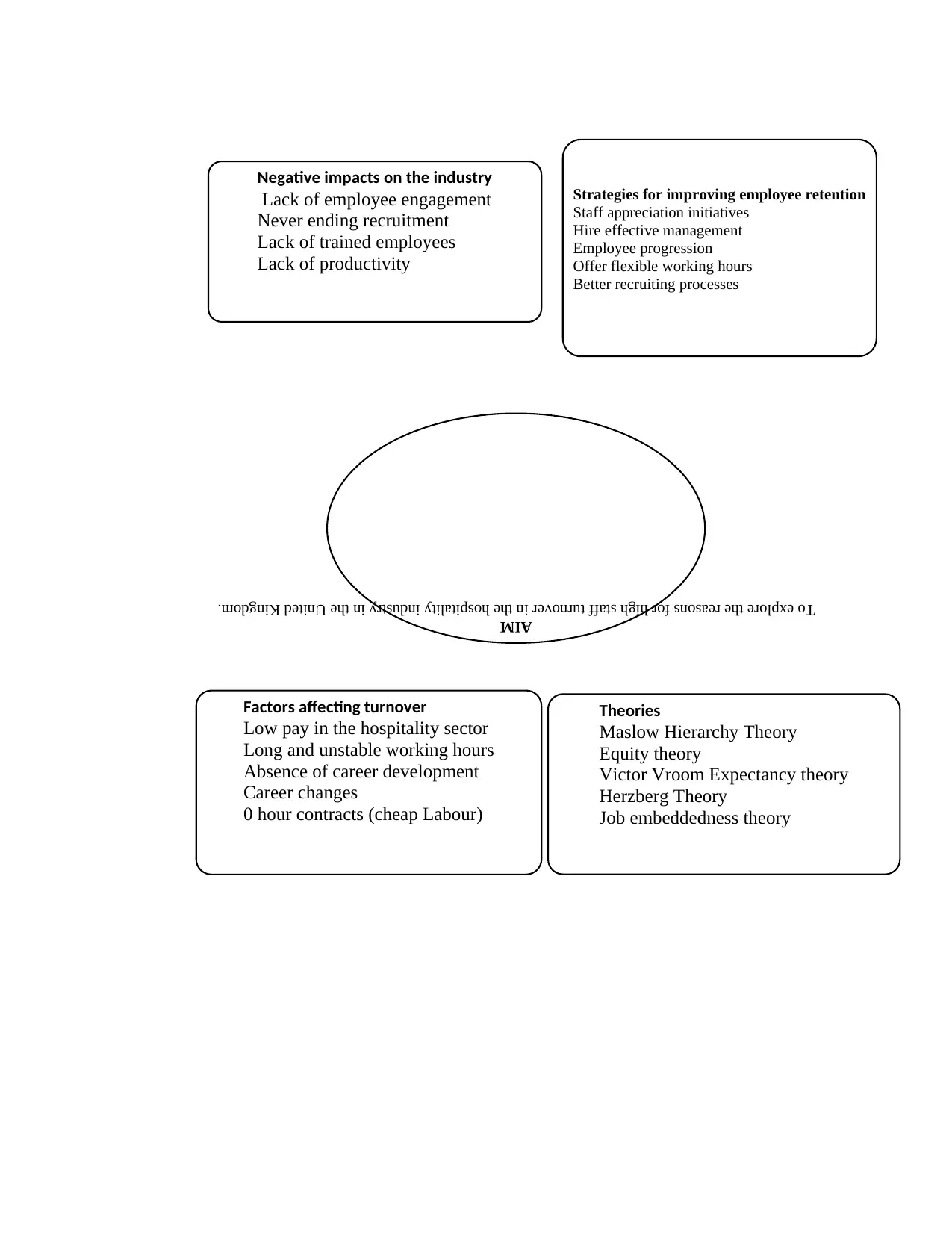
Negative impacts on the industry
Lack of employee engagement
Never ending recruitment
Lack of trained employees
Lack of productivity
Strategies for improving employee retention
Staff appreciation initiatives
Hire effective management
Employee progression
Offer flexible working hours
Better recruiting processes
AIM
To explore the reasons for high staff turnover in the hospitality industry in the United Kingdom.
Factors affecting turnover
Low pay in the hospitality sector
Long and unstable working hours
Absence of career development
Career changes
0 hour contracts (cheap Labour)
Theories
Maslow Hierarchy Theory
Equity theory
Victor Vroom Expectancy theory
Herzberg Theory
Job embeddedness theory
Lack of employee engagement
Never ending recruitment
Lack of trained employees
Lack of productivity
Strategies for improving employee retention
Staff appreciation initiatives
Hire effective management
Employee progression
Offer flexible working hours
Better recruiting processes
AIM
To explore the reasons for high staff turnover in the hospitality industry in the United Kingdom.
Factors affecting turnover
Low pay in the hospitality sector
Long and unstable working hours
Absence of career development
Career changes
0 hour contracts (cheap Labour)
Theories
Maslow Hierarchy Theory
Equity theory
Victor Vroom Expectancy theory
Herzberg Theory
Job embeddedness theory
Paraphrase This Document
Need a fresh take? Get an instant paraphrase of this document with our AI Paraphraser
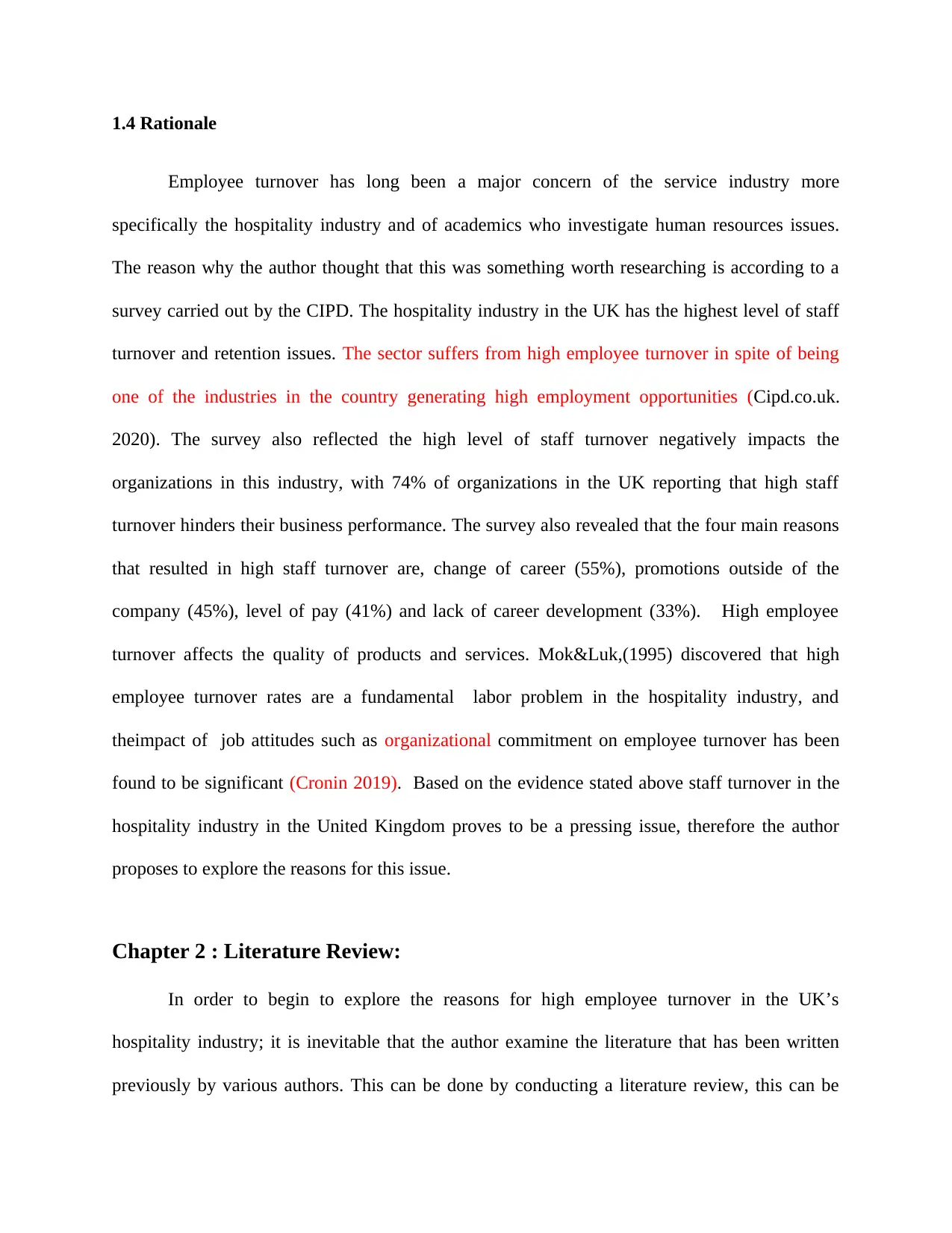
1.4 Rationale
Employee turnover has long been a major concern of the service industry more
specifically the hospitality industry and of academics who investigate human resources issues.
The reason why the author thought that this was something worth researching is according to a
survey carried out by the CIPD. The hospitality industry in the UK has the highest level of staff
turnover and retention issues. The sector suffers from high employee turnover in spite of being
one of the industries in the country generating high employment opportunities (Cipd.co.uk.
2020). The survey also reflected the high level of staff turnover negatively impacts the
organizations in this industry, with 74% of organizations in the UK reporting that high staff
turnover hinders their business performance. The survey also revealed that the four main reasons
that resulted in high staff turnover are, change of career (55%), promotions outside of the
company (45%), level of pay (41%) and lack of career development (33%). High employee
turnover affects the quality of products and services. Mok&Luk,(1995) discovered that high
employee turnover rates are a fundamental labor problem in the hospitality industry, and
theimpact of job attitudes such as organizational commitment on employee turnover has been
found to be significant (Cronin 2019). Based on the evidence stated above staff turnover in the
hospitality industry in the United Kingdom proves to be a pressing issue, therefore the author
proposes to explore the reasons for this issue.
Chapter 2 : Literature Review:
In order to begin to explore the reasons for high employee turnover in the UK’s
hospitality industry; it is inevitable that the author examine the literature that has been written
previously by various authors. This can be done by conducting a literature review, this can be
Employee turnover has long been a major concern of the service industry more
specifically the hospitality industry and of academics who investigate human resources issues.
The reason why the author thought that this was something worth researching is according to a
survey carried out by the CIPD. The hospitality industry in the UK has the highest level of staff
turnover and retention issues. The sector suffers from high employee turnover in spite of being
one of the industries in the country generating high employment opportunities (Cipd.co.uk.
2020). The survey also reflected the high level of staff turnover negatively impacts the
organizations in this industry, with 74% of organizations in the UK reporting that high staff
turnover hinders their business performance. The survey also revealed that the four main reasons
that resulted in high staff turnover are, change of career (55%), promotions outside of the
company (45%), level of pay (41%) and lack of career development (33%). High employee
turnover affects the quality of products and services. Mok&Luk,(1995) discovered that high
employee turnover rates are a fundamental labor problem in the hospitality industry, and
theimpact of job attitudes such as organizational commitment on employee turnover has been
found to be significant (Cronin 2019). Based on the evidence stated above staff turnover in the
hospitality industry in the United Kingdom proves to be a pressing issue, therefore the author
proposes to explore the reasons for this issue.
Chapter 2 : Literature Review:
In order to begin to explore the reasons for high employee turnover in the UK’s
hospitality industry; it is inevitable that the author examine the literature that has been written
previously by various authors. This can be done by conducting a literature review, this can be
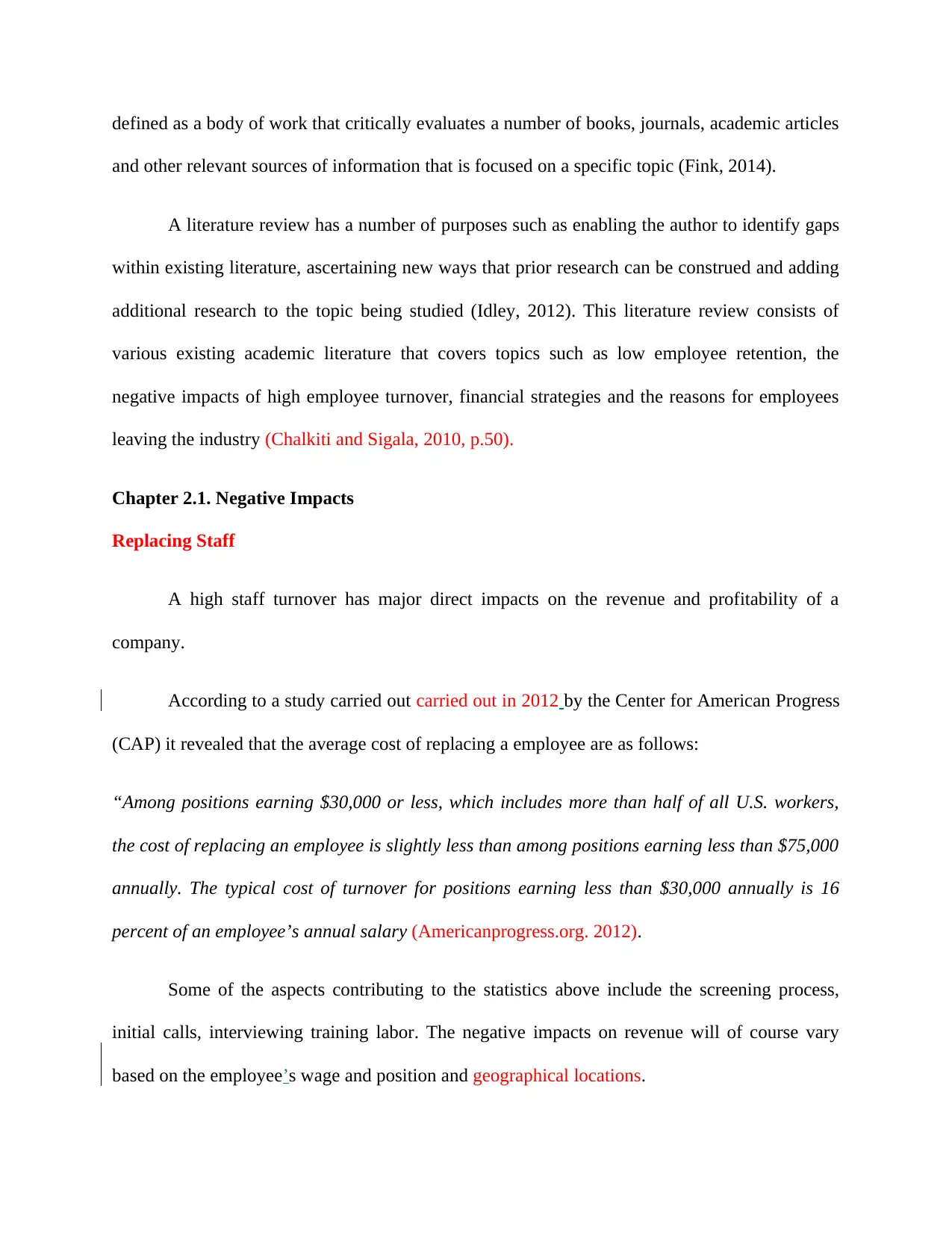
defined as a body of work that critically evaluates a number of books, journals, academic articles
and other relevant sources of information that is focused on a specific topic (Fink, 2014).
A literature review has a number of purposes such as enabling the author to identify gaps
within existing literature, ascertaining new ways that prior research can be construed and adding
additional research to the topic being studied (Idley, 2012). This literature review consists of
various existing academic literature that covers topics such as low employee retention, the
negative impacts of high employee turnover, financial strategies and the reasons for employees
leaving the industry (Chalkiti and Sigala, 2010, p.50).
Chapter 2.1. Negative Impacts
Replacing Staff
A high staff turnover has major direct impacts on the revenue and profitability of a
company.
According to a study carried out carried out in 2012 by the Center for American Progress
(CAP) it revealed that the average cost of replacing a employee are as follows:
“Among positions earning $30,000 or less, which includes more than half of all U.S. workers,
the cost of replacing an employee is slightly less than among positions earning less than $75,000
annually. The typical cost of turnover for positions earning less than $30,000 annually is 16
percent of an employee’s annual salary (Americanprogress.org. 2012).
Some of the aspects contributing to the statistics above include the screening process,
initial calls, interviewing training labor. The negative impacts on revenue will of course vary
based on the employee’s wage and position and geographical locations.
and other relevant sources of information that is focused on a specific topic (Fink, 2014).
A literature review has a number of purposes such as enabling the author to identify gaps
within existing literature, ascertaining new ways that prior research can be construed and adding
additional research to the topic being studied (Idley, 2012). This literature review consists of
various existing academic literature that covers topics such as low employee retention, the
negative impacts of high employee turnover, financial strategies and the reasons for employees
leaving the industry (Chalkiti and Sigala, 2010, p.50).
Chapter 2.1. Negative Impacts
Replacing Staff
A high staff turnover has major direct impacts on the revenue and profitability of a
company.
According to a study carried out carried out in 2012 by the Center for American Progress
(CAP) it revealed that the average cost of replacing a employee are as follows:
“Among positions earning $30,000 or less, which includes more than half of all U.S. workers,
the cost of replacing an employee is slightly less than among positions earning less than $75,000
annually. The typical cost of turnover for positions earning less than $30,000 annually is 16
percent of an employee’s annual salary (Americanprogress.org. 2012).
Some of the aspects contributing to the statistics above include the screening process,
initial calls, interviewing training labor. The negative impacts on revenue will of course vary
based on the employee’s wage and position and geographical locations.
⊘ This is a preview!⊘
Do you want full access?
Subscribe today to unlock all pages.

Trusted by 1+ million students worldwide
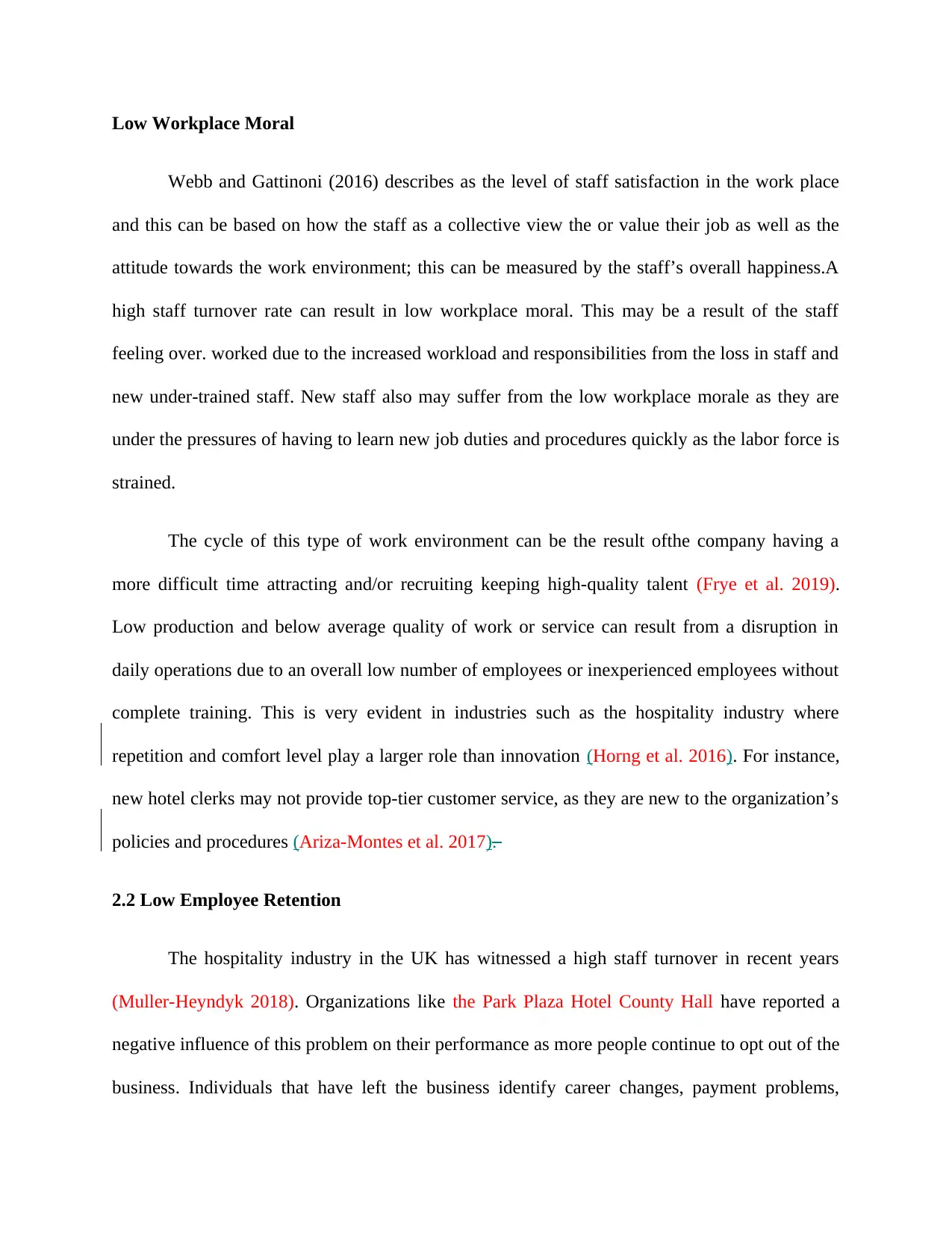
Low Workplace Moral
Webb and Gattinoni (2016) describes as the level of staff satisfaction in the work place
and this can be based on how the staff as a collective view the or value their job as well as the
attitude towards the work environment; this can be measured by the staff’s overall happiness.A
high staff turnover rate can result in low workplace moral. This may be a result of the staff
feeling over. worked due to the increased workload and responsibilities from the loss in staff and
new under-trained staff. New staff also may suffer from the low workplace morale as they are
under the pressures of having to learn new job duties and procedures quickly as the labor force is
strained.
The cycle of this type of work environment can be the result ofthe company having a
more difficult time attracting and/or recruiting keeping high-quality talent (Frye et al. 2019).
Low production and below average quality of work or service can result from a disruption in
daily operations due to an overall low number of employees or inexperienced employees without
complete training. This is very evident in industries such as the hospitality industry where
repetition and comfort level play a larger role than innovation (Horng et al. 2016). For instance,
new hotel clerks may not provide top-tier customer service, as they are new to the organization’s
policies and procedures (Ariza-Montes et al. 2017).
2.2 Low Employee Retention
The hospitality industry in the UK has witnessed a high staff turnover in recent years
(Muller-Heyndyk 2018). Organizations like the Park Plaza Hotel County Hall have reported a
negative influence of this problem on their performance as more people continue to opt out of the
business. Individuals that have left the business identify career changes, payment problems,
Webb and Gattinoni (2016) describes as the level of staff satisfaction in the work place
and this can be based on how the staff as a collective view the or value their job as well as the
attitude towards the work environment; this can be measured by the staff’s overall happiness.A
high staff turnover rate can result in low workplace moral. This may be a result of the staff
feeling over. worked due to the increased workload and responsibilities from the loss in staff and
new under-trained staff. New staff also may suffer from the low workplace morale as they are
under the pressures of having to learn new job duties and procedures quickly as the labor force is
strained.
The cycle of this type of work environment can be the result ofthe company having a
more difficult time attracting and/or recruiting keeping high-quality talent (Frye et al. 2019).
Low production and below average quality of work or service can result from a disruption in
daily operations due to an overall low number of employees or inexperienced employees without
complete training. This is very evident in industries such as the hospitality industry where
repetition and comfort level play a larger role than innovation (Horng et al. 2016). For instance,
new hotel clerks may not provide top-tier customer service, as they are new to the organization’s
policies and procedures (Ariza-Montes et al. 2017).
2.2 Low Employee Retention
The hospitality industry in the UK has witnessed a high staff turnover in recent years
(Muller-Heyndyk 2018). Organizations like the Park Plaza Hotel County Hall have reported a
negative influence of this problem on their performance as more people continue to opt out of the
business. Individuals that have left the business identify career changes, payment problems,
Paraphrase This Document
Need a fresh take? Get an instant paraphrase of this document with our AI Paraphraser
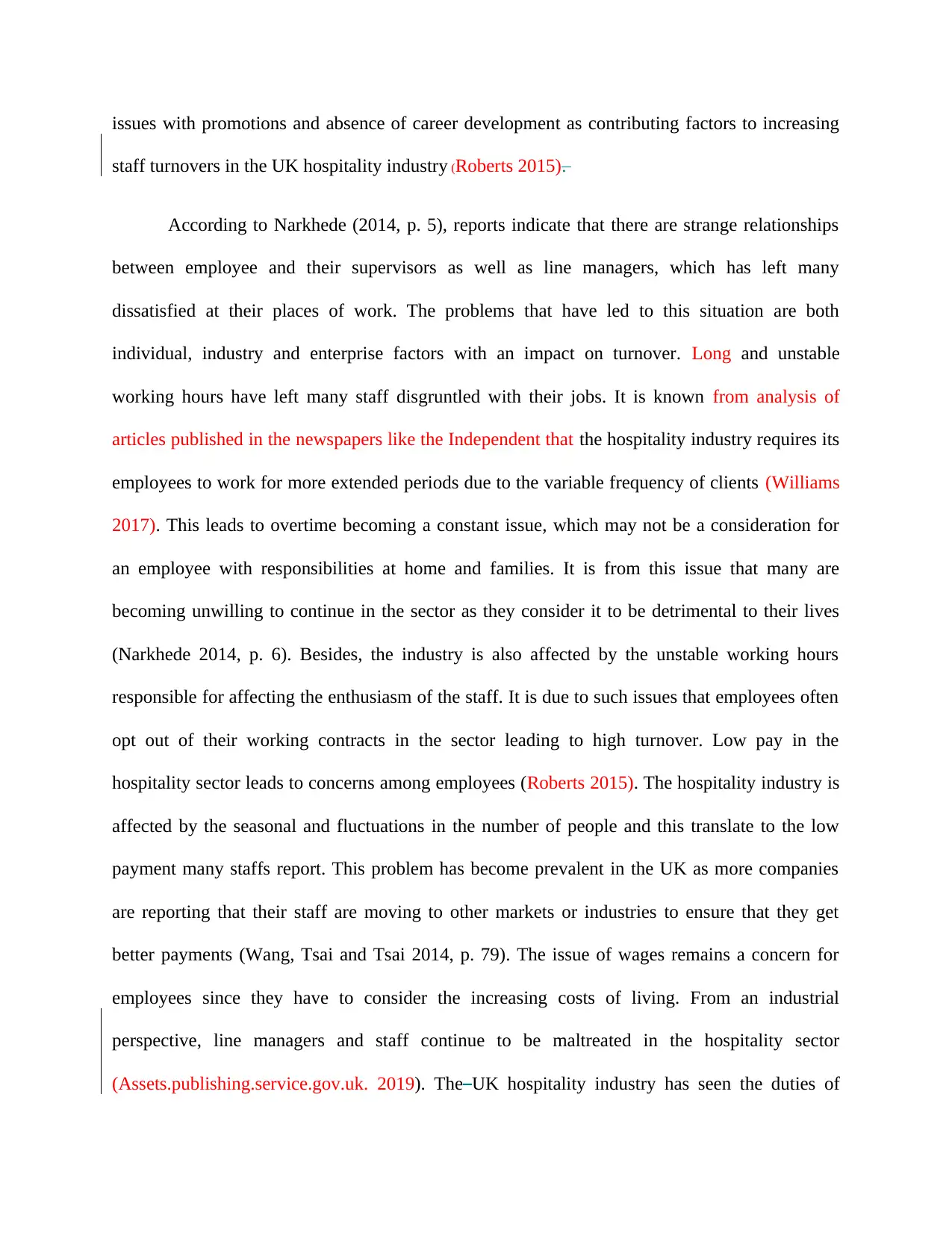
issues with promotions and absence of career development as contributing factors to increasing
staff turnovers in the UK hospitality industry (Roberts 2015).
According to Narkhede (2014, p. 5), reports indicate that there are strange relationships
between employee and their supervisors as well as line managers, which has left many
dissatisfied at their places of work. The problems that have led to this situation are both
individual, industry and enterprise factors with an impact on turnover. Long and unstable
working hours have left many staff disgruntled with their jobs. It is known from analysis of
articles published in the newspapers like the Independent that the hospitality industry requires its
employees to work for more extended periods due to the variable frequency of clients (Williams
2017). This leads to overtime becoming a constant issue, which may not be a consideration for
an employee with responsibilities at home and families. It is from this issue that many are
becoming unwilling to continue in the sector as they consider it to be detrimental to their lives
(Narkhede 2014, p. 6). Besides, the industry is also affected by the unstable working hours
responsible for affecting the enthusiasm of the staff. It is due to such issues that employees often
opt out of their working contracts in the sector leading to high turnover. Low pay in the
hospitality sector leads to concerns among employees (Roberts 2015). The hospitality industry is
affected by the seasonal and fluctuations in the number of people and this translate to the low
payment many staffs report. This problem has become prevalent in the UK as more companies
are reporting that their staff are moving to other markets or industries to ensure that they get
better payments (Wang, Tsai and Tsai 2014, p. 79). The issue of wages remains a concern for
employees since they have to consider the increasing costs of living. From an industrial
perspective, line managers and staff continue to be maltreated in the hospitality sector
(Assets.publishing.service.gov.uk. 2019). The UK hospitality industry has seen the duties of
staff turnovers in the UK hospitality industry (Roberts 2015).
According to Narkhede (2014, p. 5), reports indicate that there are strange relationships
between employee and their supervisors as well as line managers, which has left many
dissatisfied at their places of work. The problems that have led to this situation are both
individual, industry and enterprise factors with an impact on turnover. Long and unstable
working hours have left many staff disgruntled with their jobs. It is known from analysis of
articles published in the newspapers like the Independent that the hospitality industry requires its
employees to work for more extended periods due to the variable frequency of clients (Williams
2017). This leads to overtime becoming a constant issue, which may not be a consideration for
an employee with responsibilities at home and families. It is from this issue that many are
becoming unwilling to continue in the sector as they consider it to be detrimental to their lives
(Narkhede 2014, p. 6). Besides, the industry is also affected by the unstable working hours
responsible for affecting the enthusiasm of the staff. It is due to such issues that employees often
opt out of their working contracts in the sector leading to high turnover. Low pay in the
hospitality sector leads to concerns among employees (Roberts 2015). The hospitality industry is
affected by the seasonal and fluctuations in the number of people and this translate to the low
payment many staffs report. This problem has become prevalent in the UK as more companies
are reporting that their staff are moving to other markets or industries to ensure that they get
better payments (Wang, Tsai and Tsai 2014, p. 79). The issue of wages remains a concern for
employees since they have to consider the increasing costs of living. From an industrial
perspective, line managers and staff continue to be maltreated in the hospitality sector
(Assets.publishing.service.gov.uk. 2019). The UK hospitality industry has seen the duties of
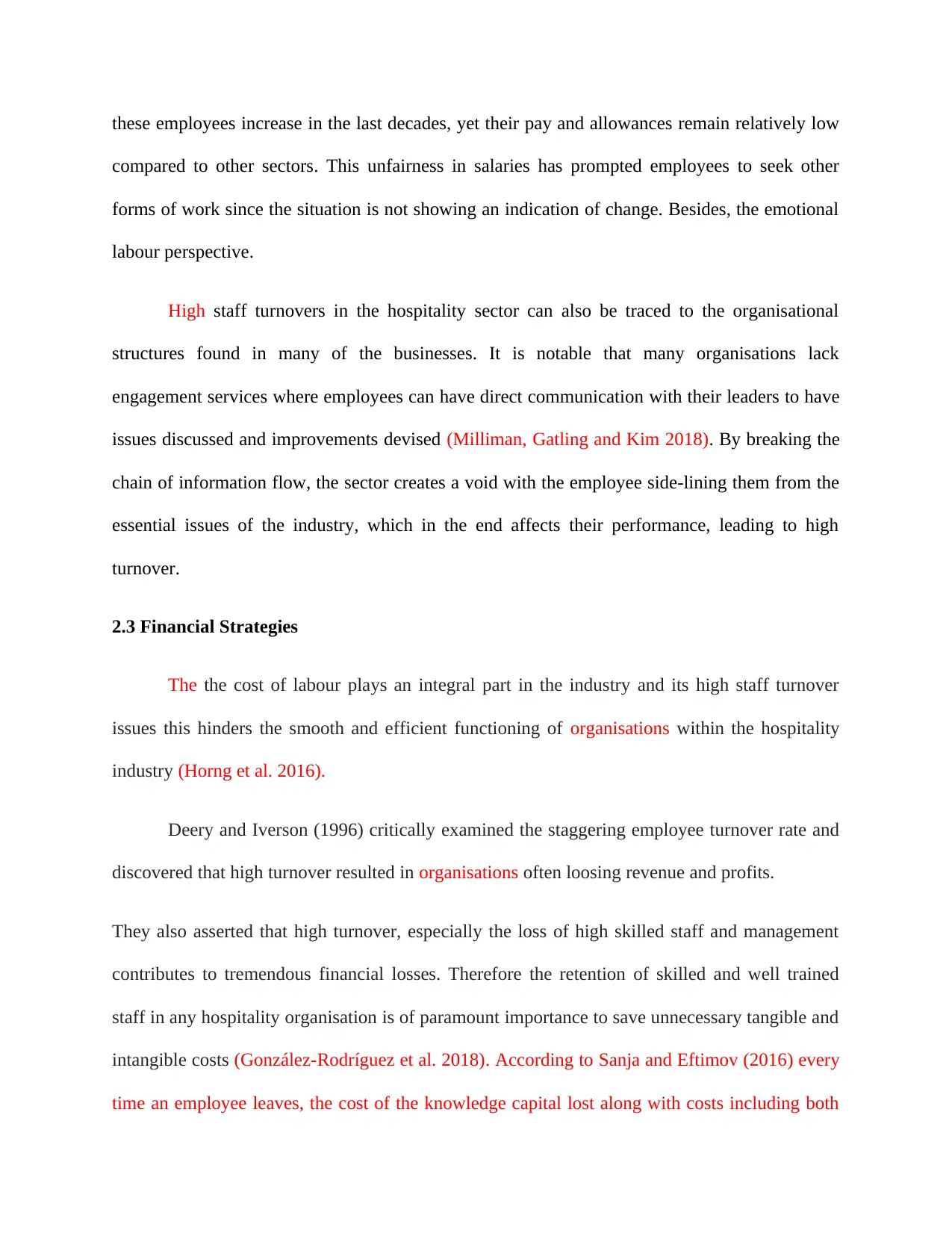
these employees increase in the last decades, yet their pay and allowances remain relatively low
compared to other sectors. This unfairness in salaries has prompted employees to seek other
forms of work since the situation is not showing an indication of change. Besides, the emotional
labour perspective.
High staff turnovers in the hospitality sector can also be traced to the organisational
structures found in many of the businesses. It is notable that many organisations lack
engagement services where employees can have direct communication with their leaders to have
issues discussed and improvements devised (Milliman, Gatling and Kim 2018). By breaking the
chain of information flow, the sector creates a void with the employee side-lining them from the
essential issues of the industry, which in the end affects their performance, leading to high
turnover.
2.3 Financial Strategies
The the cost of labour plays an integral part in the industry and its high staff turnover
issues this hinders the smooth and efficient functioning of organisations within the hospitality
industry (Horng et al. 2016).
Deery and Iverson (1996) critically examined the staggering employee turnover rate and
discovered that high turnover resulted in organisations often loosing revenue and profits.
They also asserted that high turnover, especially the loss of high skilled staff and management
contributes to tremendous financial losses. Therefore the retention of skilled and well trained
staff in any hospitality organisation is of paramount importance to save unnecessary tangible and
intangible costs (González-Rodríguez et al. 2018). According to Sanja and Eftimov (2016) every
time an employee leaves, the cost of the knowledge capital lost along with costs including both
compared to other sectors. This unfairness in salaries has prompted employees to seek other
forms of work since the situation is not showing an indication of change. Besides, the emotional
labour perspective.
High staff turnovers in the hospitality sector can also be traced to the organisational
structures found in many of the businesses. It is notable that many organisations lack
engagement services where employees can have direct communication with their leaders to have
issues discussed and improvements devised (Milliman, Gatling and Kim 2018). By breaking the
chain of information flow, the sector creates a void with the employee side-lining them from the
essential issues of the industry, which in the end affects their performance, leading to high
turnover.
2.3 Financial Strategies
The the cost of labour plays an integral part in the industry and its high staff turnover
issues this hinders the smooth and efficient functioning of organisations within the hospitality
industry (Horng et al. 2016).
Deery and Iverson (1996) critically examined the staggering employee turnover rate and
discovered that high turnover resulted in organisations often loosing revenue and profits.
They also asserted that high turnover, especially the loss of high skilled staff and management
contributes to tremendous financial losses. Therefore the retention of skilled and well trained
staff in any hospitality organisation is of paramount importance to save unnecessary tangible and
intangible costs (González-Rodríguez et al. 2018). According to Sanja and Eftimov (2016) every
time an employee leaves, the cost of the knowledge capital lost along with costs including both
⊘ This is a preview!⊘
Do you want full access?
Subscribe today to unlock all pages.

Trusted by 1+ million students worldwide
1 out of 48
Related Documents
Your All-in-One AI-Powered Toolkit for Academic Success.
+13062052269
info@desklib.com
Available 24*7 on WhatsApp / Email
![[object Object]](/_next/static/media/star-bottom.7253800d.svg)
Unlock your academic potential
Copyright © 2020–2026 A2Z Services. All Rights Reserved. Developed and managed by ZUCOL.





